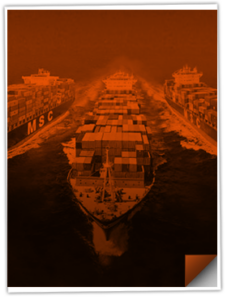Featured Headlines:
BIS Puts the Squeeze on Export Regulation Violators
Rumor Has It... US Contemplates Section 301 Decision!
US Trucking Hodge and Railroad Podge
Steamships Never Demur on Storage Profits
BIS Puts the Squeeze on Export Regulation Violators
- On June 30th, Max Axelrod, Assistant Secretary for Export Enforcement at the US Department of Commerce issued a memo stressing the agency’s core mission “of preventing sensitive U.S. technologies and goods from being used for malign purposes by those would do us harm.” The memo was issued following this year’s Intelligence Community’s Annual Threat Assessment—recently published by the Office of the Director of National Intelligence—which detailed that the gravest national security threats faced by the United States are related to nation-state actors: China, Russia, Iran, and North Korea.
- Axelrod also noted that criminal prosecution “is an important tool in our toolbox but, it’s not our only tool. Our administrative penalties also have bite” and are an important deterrent.
- As such, the Bureau of Industry and Security (BIS) changed the regulation governing when administrative charging letters became public. Prior to the change, letters did not become public until after the matter was resolved which could often be years later. Now, charging letters are public when filed with the Administrative Law Judge; and once filed, they also become accessible to the public on the BIS website.
- Additionally, four (4) policy changes within the Export Administration Regulations (EAR) became effective immediately; these included the following:
- Imposition of Significantly Higher Penalties;
- Using Non-Monetary Resolutions for Less Serious Violations;
- Elimination of “No Admit, No Deny” Settlements; and
- Dual-Track Processing of Voluntary Self-Disclosures.
- The BIS is committed to enforcement to better protect our national security and to protect the US against unfair advantages in the marketplace. They plan to issue stiff monetary penalties or potentially deny export privileges, or both.
Rumor Has It... US Contemplates Section 301 Decision!
- On July 4th, US Treasury Secretary, Janet Yellen and Chinese Vice Premier Liu He held a phone conference to discuss the status of Section 301 tariffs, as well as the United States’ continued criticism of China’s “unfair, non-market foreign economic practices.”
- According to officials, China continues to be vehemently against US tariff actions; and claims that the cancellation of all the Section 301 tariffs could reduce US inflation rate by approximately 1%.
- Although the call yielded no official decision, the Wall Street Journal reported this week that President Biden may lift of suspend tariffs on consumer goods, create a broader exclusion process and hike tariffs on “strategic items such as industrial machinery and transportation equipment.”
- For more information regarding Section 301 tariffs, visit our webpage.
Russian Tariff Update
- As you may already be aware, President Biden issued an Executive Order last week that will increase Column 2 tariff rates to 35% on more than 570 groups of Russian products effective July 27, 2022.
- The full list of 8-digit Harmonized Schedule codes that will be taxed at 35% is now available in the Federal Register; click here to see the affected products.
- Importers should note that some products that were high-volume exports from Russia—yet not on this list—do face higher tariffs under Column 2. These items include frozen crab, pig iron and specialty plywood.
US Trucking Hodge and Railroad Podge
- Texas is the latest state to adopt digital license plates for heavy-load trucks. The innovative technology, already in place in California and Arizona, allows for trip/mileage tracking, time location monitoring, and theft protection. Owners can place vehicles in stolen mode which triggers GPS tracking. Plus, several reputable companies are on record saying that digital license plates are also simply “way cool.”
- After three years of court appeals, California’s Assembly Bill 5 (AB5) will become law after the US Supreme Court decided on the matter. AB5 calls for the elimination of the independent contractor model in California. Please note the following key takeaways:
- There are currently over 70,000 owner-operators in California.
- The law will affect the port drayage sector the most.
- Trucking companies have just seven days to comply with the regulations.
- Many trucking companies will be forced to convert to a truck brokerage model to comply with AB5.
- While the law is well-intentioned from a workers’ rights level, it is expected to negatively affect overall drayage supply at the US ports on the West Coast most in need of that supply.
- Oh, the joy…New York, Norfolk, Miami, Houston, LA/LGB, and Seattle have extended their record to 52 weeks! That’s right folks, 52 straight weeks of requiring two weeks’ notice to book drayage services. The importing public must be so proud!
- The Union Pacific Railroad (UP) is working to double the container capacity of a key rail ramp outside of Oakland in the next two years; the multi-year capital project is part of a systemwide UP effort to increase capacity while simplifying the overall network footprint.
- The US Department of Transportation (DOT) wants to eliminate as many rail crossings as possible, and they are putting their money where their mouth is to prove it. The DOT has established grants of over $600 million for the Federal Railroad Administration (FRA) to improve rail safety nationwide. To date, one driver (from Maine) has complained about the lack of quiet time spent waiting for oncoming trains to pass.
The Global Grumble Jumble
- Well, at least China is letting US officials inspect Chinese manufacturing sites! US export controls officers recently visited Wuxi, China where it is believed they evaluated Wuxi Biologics, a key manufacturer of ingredients for AstraZeneca. In a sign of the times, officials from both nations pointed to the inspection as a positive development. (Yippee!)
- Even as the two global powerhouses discuss the mitigation and/or elimination of Section 301 “Trump” tariffs, trade tensions are extremely high between the US and China. US sanctions on imports linked to forced labor and the potential delisting of Chinese exporters that fail to meet audit requirements related to forced labor head the list of grumbles, grievances, and growls.
- Enter Russia—for five months now, the US has led dozens of other world governments in banning the export of advanced technologies to Russia as a means of hobbling Russia’s military development. Russia claims that these embargos are intended to damage the broader Russian economy and well-being of Russian civilians.
- World transportation labor unrest has whirled supply chains in Korea, UK, Germany, Spain, and Canada. As inflation does soar, worker morale is poor. All eyes are on the ILWU on the US West Coast; no new deal for eight days and counting.
- The US is investigating the expansion of export restrictions for China and other countries that violate human rights and/or pose a risk to US national security. China was just thrilled to hear this! China told all its friends that the US better not count on getting the rare minerals it needs for all kinds of technology nor plan on being invited to the prom after-party.
- Enter Russia AND China—the US is also monitoring Chinese exports to Russia; should China assist Russia, especially with sensitive military technologies, US efforts to destabilize Russia will be far less effective.
- American consumers could be heard grumbling from coast to coast after it was revealed that 17% of the fuel released from the Strategic Petroleum Reserve (SPR) was exported to Europe and Asia even as US gas and diesel prices established new records. Oh yay! In further good news, the SPR itself is at the lowest level since 1986.
Steamships Never Demur on Storage Profits
- Even as global average fees for demurrage and detention (D&D) wane in 2022, US shippers continue to pay the highest average storage fees in the galaxy (yes, we checked).
- All five of the world’s most expensive D&D ports are in the good ol’ US of A.
- Global average container storage soared by 150% in 2021, but the US won the gold medal with a 250% increase. In 2021, the average D&D cost per container eclipsed $1000!
- Several US importers have begun legal proceedings against ocean carriers and port operators for what is seen as profiteering on storage.
- With ocean rates absolutely destroying historical records in 2021, it seems almost unfathomable that carriers would also exploit shippers on storage. Right? Right?!?!
Airlines All Apologies
- Nirvana once said, “I wish I was like you, easily amused,” and global airlines wish their passengers and cargo customers were easily amused, too. Since they aren’t, Delta’s CEO, Ed Bastain, followed Lufthansa’s lead this week and was all apologies in public for poor service. Bastian said, “…this level of disruption and uncertainty is unacceptable.”
- Since late May, 4% of Delta’s flights have been cancelled, with an additional 20% delayed by an average of an hour. This may not smell like teen spirit (no, not the airline!), but it certainly highlights the staffing crisis and scheduling chaos plaguing the airline industry. Somewhat shockingly, Delta’s delayed flight rate is lower than the industry average of 25.4%.
- You’ve got to know when to fold ‘em. Air Canada is cancelling over 15% of their flights for the next two months in response to labor scarcity and the demand surge. While avoiding a direct apology, the airline has indicated that the move should improve the reliability of flights still on their routing board.
- As global air cargo capacity increased 1% from May to June, global demand shrank by 2%. As a result, one would expect that many markets would experience modest rate reductions; the Asia-US market in both directions, for example, has fallen by approximately 7%. While one expects this reality to lead to lower profits, we’ll have to watch airline press releases closely. The steamship industry is announcing profit increases over 50% on volumes down more than 10%. (Hmmmmm, that sounds fair…Yes, yes, it does.)
- Oh wait, this just in! For June, global chargeable weight was down 9% while the global average airfreight rate was up 18%. Sounds like the airlines called the steamship lines for some pricing tips! Nice to see collaboration in these acrimonious times.



